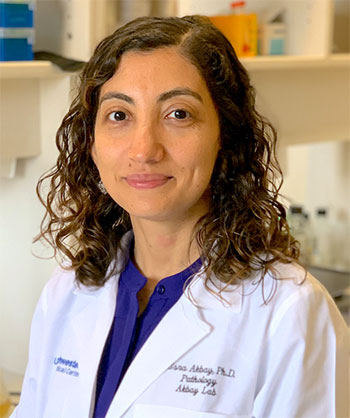2020 A Breath of Hope Fellow
Dr. Esra Akbay of the University of Texas Southwestern Medical Center
A Breath of Hope is honored to announce our 2020 Research Fellow and the winner of the Katherine Bensen Hope Award—Dr. Esra Akbay of the University of Texas Southwestern Medical Center. Dr. Akbay’s winning proposal focuses on overcoming resistance to immune checkpoint blockade in lung cancer by targeting Telomerase. Dr. Akbay proposes to target an essential survival mechanism of tumor cells to activate protective anti-tumor immunity and immune memory.
Dr. Esra Akbay

Dr. Akbay started her scientific training at Bilkent University in Ankara, Turkey majoring in Molecular Biology and Genetics. After graduating she moved to the United States for PhD studies. She joined the Cancer Biology PhD program at UT Southwestern Medical Center and studied the role of telomere shortening in endometrial cancer development. Her work led to the development of first preclinical model of type II endometrial cancer.
For her postdoctoral studies, Dr. Akbay joined the lab of Dr. Kwok-Kin Wong at Dana Farber Cancer Institute, Harvard Medical school. Her postdoctoral studies focused on developing novel mouse models and studying the tumor immune micro-environment. Her work led to a better understanding of tumor immune escape mechanisms.
Dr. Akbay moved to UT Southwestern Medical Center as an assistant professor in 2016. Research in her laboratory focuses on understanding how tumors evade the immune surveillance and designing therapies that target these escape mechanisms and activate anti-tumor immunity.
April 2022 Progress Report:
During this funding period, we investigated tumor and immune cell interactions in the context of telomerase inhibitor. We performed experiments to determine the mechanism of communication of tumor DNA damage to the killer immune cells through other immune subtypes. We determined that telomerase inhibition activates lymphocytes and dendritic cells. In a short-term treatment assay with the drug in mice, we observe induction of tumor cell killing and reduction of tumor growth. These changes correlated with increased damage to the tumor DNA.
May 2021 Progress Report
Tumors have features that differentiate them from the normal cells and to be recognized by the different components of the host immune system under normal conditions. In some people tumors are able to bypass these mechanisms, locally suppress immune system and are able to grow in people with otherwise competent immune system. Recent efforts have resulted in the better understanding of particular interactions between tumor cells and immune cells called immune checkpoint pathways. Treatments that block immune checkpoint pathways (PD-1/PD-L1) and release the break on the killer T cells within the immune system have provided durable responses in a subset of lung cancer patients. These findings suggest that targeting the mechanisms tumor cells utilize to evade the immune system can be efficacious and new mechanisms need to be discovered for therapy resistant tumors.
Ends of the chromosomes –telomeres cannot be replicated as the rest of the chromosomes and thus get shorter with each cell division-marking cell’s age. Cells are equipped with the proper machinery to detect the short telomeres to stop cell division when these structures reach a critical length. Unlike normal cells, majority of cancer cells activate an enzyme called telomerase to replicate these parts of the chromosomes to bypass these normal security checks. This enzyme is essential for the growth and survival of cancer cells. We proposed to target this enzyme with a nucleoside analog. Our goals were 1: To determine how the DNA damage caused by using this modified nucleotide specially consumed by telomerase can be communicated to the immune system by the cancer cells and 2; to evaluate the therapeutic efficacy of combination of targeting telomerase and current treatments. We determined that this nucleoside analog can efficiently activate DNA damage signaling in the tumor cells specifically at the telomeres in a time dependent manner. We have made progress on genetically inactivating certain components of the innate sensing pathway that communicates sensing of DNA in the improper locations inside the cells to the immune system. Additionally, we have confirmed that even at a previously untested tumor site- subcutaneous tumors of the mouse lung cancer model are responsive to this modified nucleoside analog as well as the orthotopic sites. We are currently identifying other changes in the cancer cells and immune cells and optimizing combination treatment schedules with rational treatment partners.

